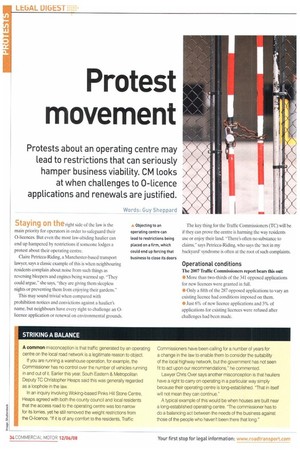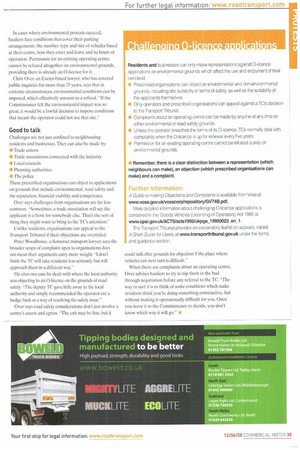Protest movement
Page 34

Page 35

If you've noticed an error in this article please click here to report it so we can fix it.
Protests about an operating centre may lead to restrictions that can seriously hamper business viability. CM looks at when challenges to 0-licence applications and renewals are justified.
Words: Guy Sheppard
Staying on the right side of the law is the main priority for operators in order to safeguard their 0-licences. But even the most law-abiding haulier can end up hampered by restrictions if someone lodges a protest about their operating centre.
Claire Petricca-Riding, a Manchester-based transport lawyer, says a classic example of this is when neighbouring residents complain about noise from such things as reversing bleepers and engines being warmed up. `They could argue," she says, "they are giving them sleepless nights or preventing them from enjoying their gardens."
This may sound trivial when compared with prohibition notices and convictions against a haulier's name, but neighbours have every right to challenge an 0licence application or renewal on environmental grounds. The key thing for the Traffic Commissioners (TC) will be if they can prove the centre is harming the way residents use or enjoy their land. "There's often no substance to claims," says Petricca-Riding, who says the 'not in my backyard' syndrome is often at the root of such complaints.
Operational conditions
The 2007 Traffic Commissioners report bears this out: • More than two-thirds of the 341 opposed applications for new licences were granted in full.
• Only a fifth of the 287 opposed applications to vary an existing licence had conditions imposed on them.
• Just 6% of new licence applications and 3% of applications for existing licences were refused after challenges had been made. In cases where environmental protests succeed, hauliers face conditions that cover their parking arrangements, the number, type and size of vehicles based at their centre, how they enter and leave and its hours of operation. Permission for an existing operating centre cannot be refused altogether on environmental grounds, providing there is already an 0-licence for it.
Chris Over, an Exeter-based lawyer, who has covered public inquiries for more than 25 years, says that in extreme circumstances, environmental conditions can be imposed, which effectively amount to a refusal. "If the Commissioner felt the environmental impact was so great, it would be a lawful decision to impose conditions that meant the operator could not use that site."
Good to talk
Challenges are not just confined to neighbouring residents and businesses. They can also be made by: • Trade unions • Trade associations connected with the industry • Local councils • Planning authorities • The police These prescribed organisations can object to applications on grounds that include environmental, road safety and the reputation, financial viability and competence.
Over says challenges from organisations are far less common. "Sometimes, a trade association will say the applicant is a front for somebody else. That's the sort of thing they might want to bring to the TC's attention."
Unlike residents, organisations can appeal to the Transport Tribunal if their objections are overruled.
Peter Woodhouse, a Somerset transport lawyer, says the broader scope of complaint open to organisations does not mean their arguments carry more weight. "I don't think the TC will take residents less seriously, but will approach them in a different way."
He cites one case he dealt with where the local authority was objecting to an 0-licence on the grounds of road safety "The deputy TC gave little away to the local authority and simply recommended the operator cut a hedge back as a way of resolving the safety issue."
Over says road safety considerations don't just involve a centre's access and egress. "The exit may be line, but it could still offer grounds for objection if the place where vehicles can next turn is difficult."
When there are complaints about an operating centre, Over advises hauliers to try to nip them in the bud through negotiation before any referral to the TC. "The way to sort it is to think of some conditions which make residents think you're doing something constructive, but without making it operationally difficult for you. Once you leave it to the Commissioner to decide, you don't know which way it will go."
















































































































































































